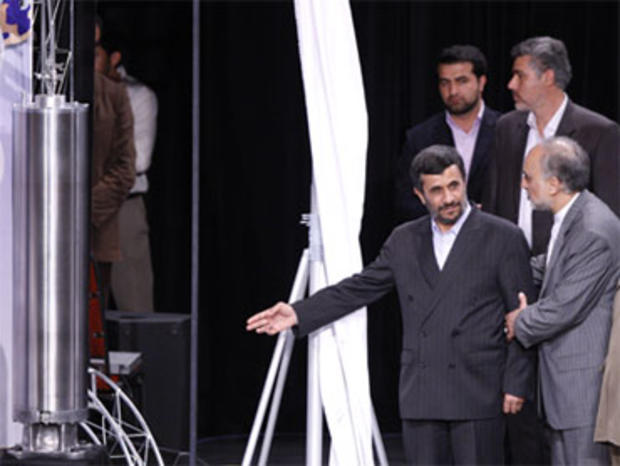Iran Nuke Chief Stuck Between Science, Politics
This story was filed by CBS News correspondent Elizabeth Palmer.
Ali Akbar Salehi is a fan of America.He's also the Head of Iran's Atomic Energy Agency; the man at the helm of Iran's uncompromising - and expanding - uranium enrichment, which has provoked a new international push for United Nations sanctions.
Nevertheless, "I have a lot of respect for President Obama," Salehi tells CBS News. "I have a lot of respect for the U.S."
"It's a country that has served humanity so much, in terms of technology, In terms of science."
During our interview in the leafy compound at the bureaucratic heart of Iran's nuclear establishment, Dr. Salehi was proud to tell me he'd earned his Ph.D. in nuclear physics at the prestigious MIT, in Cambridge, Massachusetts. That was back in 1977.
Above: Iranian President Mahmoud Ahmadinejad, left, gestures to chief of Iran's Atomic Energy Organization, Ali Akbar Salehi, after unveiling a third generation of domestically built centrifuge, at left, during a ceremony marking Iran's National Day of Nuclear Technology in Tehran, Iran, April 9, 2010.
He is, he says, still indebted to his American professors.
So why can't this sophisticated, reasonable man find a way to end the standoff with America and Europe over Iran's nuclear program?
In our interview, he took the party line -- scoffing at the International Atomic Energy Agency's accusation that Iran wasn't cooperating to allay fears it had secret plans to build a bomb.
Full Transcript of the Salehi Interview
"What is enough cooperation?" he asked. "The Agency inspectors are residing in Iran. Okay? They have their cameras taking pictures 24 hours per day."
"They have [unannounced] inspections every now and then... What more do we have to do?"
Click below to watch Palmer's report for "The Evening News"
As Salehi knows very well, there are several things that Iran could do to defuse suspicion.
It could allow the IAEA access to sensitive documents, and key people.
It could suspend its uranium enrichment for a trial period (as it did in 2004) to clear the way for talks.
It could come clean about what new nuclear plants it's planning to build.
But Iran doesn't do any of these things because its government is deeply conflicted about rapprochement with the West. A warming of relations would threaten the power -- political and financial -- of many senior regime members.
In October, 2009, both sides came very close to an unprecedented deal that might - in the words of one U.S. adviser to the process - have been the equivalent of a Nixon-to-China moment, transforming U.S.-Iranian relations.
Under the deal, Iran would have traded most of its enriched uranium for fuel to power a research reactor in Tehran that makes medical isotopes. Crucially, in a side agreement, the U.S. would have given Iran - among other things - help with upgrading the reactor.
"It was a great deal, and many Iranians recognized it was a great deal," said a senior Obama administration official. "Salehi wanted it to work. Even President Ahmadinejad wanted it to work."
But in the end, it didn't.
Various observers, both inside and outside Iran, believe President Ahmadinejad's political opponents helped to scupper it. They didn't want him to scoop the credit for opening a new chapter in diplomatic relations with the United States.
Meanwhile, Dr. Salehi is bracing himself and his nuclear program - which by any measure is impressive, and has trained some excellent scientists - for new sanctions.
"Of course sanctions will affect us, but they will only delay our projects - not stop them."
"Will they hurt?" I asked him.
"Of course," he said, noting that he relies on imported material for his agency's work. "They will hurt... so we will have to come up with our own manufacturing systems."
Salehi is a scientist trying to do cutting edge nuclear research. The new sanctions, stemming from poisonous politics, must be deeply frustrating to him.
"I am sure..." He pauses, and then starts again. "I am optimistic that this issue will be resolved in the future because there is no other way."
"I mean it is for the benefit of both sides to resolve this issue."
Here's hoping, Dr. Salehi.

